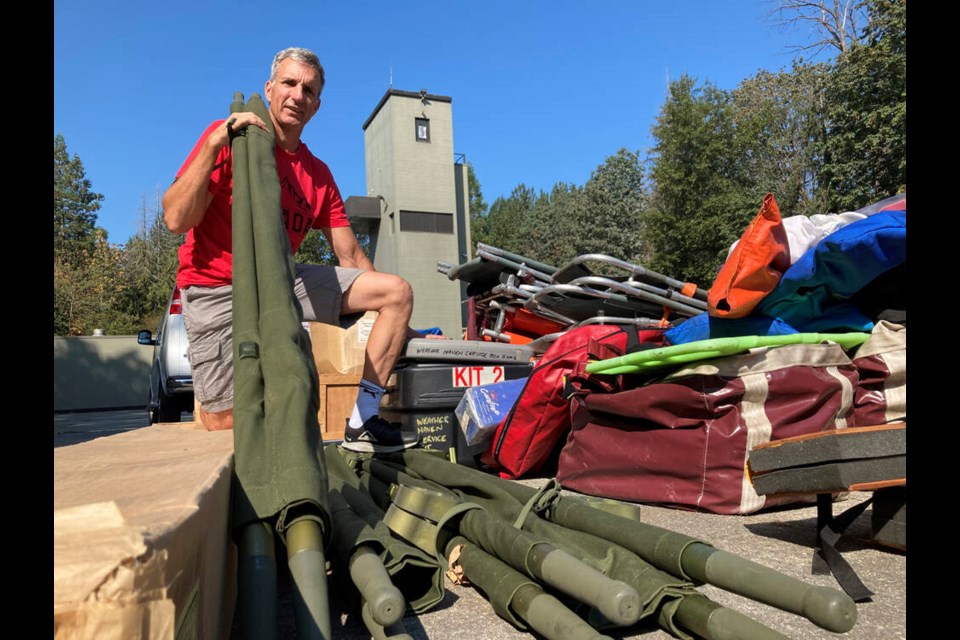For almost 30 years, a NATO-grade field hospital sat in storage in North Vancouver.
Now those 200 beds and other life-saving supplies are being transported to front lines in Ukraine, where soldiers continue to defend the country from the ongoing invasion by Russia.
The effort is being led by Defend Ukraine Foundation (Canada), made up of a small team of volunteers in the Vancouver area – three are military veterans and one is a former civilian investigator for the RCMP.
The last items from their current operation – dubbed “Hawkeye” after the chief surgeon on the ’70s sitcom M*A*S*H – were loaded into a van Thursday at District of North Vancouver Fire and Rescue Services’ training centre by Inter River Park.
Those remaining supplies include eight field hospital stretchers, four back boards, ropes and water rescue materials donated by North Shore Rescue, which will be loaded into another group’s shipping container that’s heading to Ukraine next week.
“All the outdoor rescue material that they would be using in the North Shore mountains or Capilano and Lynn Canyon is equally applicable and useful for urban rescue,” explained Defend Ukraine operating manager Brent Mudry, a retired financial investigator for the RCMP.
“When you have missile hits on residential and office buildings and schools, the same stretchers and materials, ropes and whatnot, are extremely useful and much needed for urban rescues,” he said.
While Thursday’s load will be put to good use when it reaches Ukraine, that’s just overflow. All in all, the Hawkeye operation included 200 folding cots, 200 field stretchers, 600 blankets and more medical supplies from the 1970s-era field hospital kit that was originally intended as earthquake preparedness gear.
Defend Ukraine was alerted to the supplies by Jared Reynolds, a North Vancouver firefighter and Afghanistan War veteran. The gear was tightly packed in a 40-foot orange shipping container. It cost around $14,000 to ship it, with 40 per cent of the bill covered by two North Van fire charities: District of North Vancouver Fire Fighters Charitable Society and IAFF 1183 Charitable.
The rail portion of the journey, from Pitt Meadows to Montreal, was donated by CP Rail on its hotshot express freight train. Then it made the trip to Bremerhaven, Germany.
After clearing German customs, the supplies were re-packed on a transport truck because no containers are entering Ukraine right now. From there, it crossed through Poland before reaching its destination in Ternopil, a city in Western Ukraine.
The final part of the journey is made by volunteers driving trucks and sprinter vans to seven major cities in Eastern and Southern Ukraine, as well as a few smaller ones.
“The last mile is quite crucial to deploying anything,” Mudry said, “which is the same as you’d expect in any kind of military operation or when you’re trying to supply a forest fire disaster in B.C., for example, it’s getting the equipment to where it’s needed.”
The drive is a difficult one, he added, as they enter increasingly more dangerous areas closer to the front where equipment Defend Ukraine has sent is in use in civilian and military hospitals.
“We have a load in transit right now. And every couple of hours, we’re getting photographs and updates as to where they are and how things are going.”
'In this for the longest haul'
Since March, Defend Ukraine completed four other projects which involved air-freighting 68 pallets of hospital, medical, civilian defence and humanitarian aid on three separate flights; and a venture that gathered and shipped more than three tonnes of gear from almost 20 fire departments across B.C. to partner NGO, Firefighter Aid Ukraine.
“I don’t have any military background myself,” Mudry said. “But I, like most Canadians, value freedom and democracy and realize how fragile it can be.”
His grandparents on his father’s side emigrated from Ukraine to Calgary in the early 1900s. Although he has no Ukrainian language, culture or direct connections in the country, Mudry said the conflict hit close to heart.
“It felt like something you have to do,” he said. “Fortunately or fortuitously, I just retired from the RCMP and was looking for a retirement project.”
Up next for Mudry and his team is operation Bethune, where the plan is to collect more fire and rescue supplies from across B.C. in another container expected to leave in the third or fourth week of September. For that shipment, Mudry said they have a desperate need for more funding. Donations can be made on Defend Ukraine’s website, and tax receipts can be arranged.
The organization’s efforts won’t stop there.
“We’re in this for the longest haul,” Mudry said. “Our vision is not defend Ukraine, our vision is defend and rebuild Ukraine. Once the war ends, and Ukraine prevails – which will happen – then we want to get involved with helping out in the rebuild campaign, which will be massive.”
For regular updates on the team’s efforts, follow Defend Ukraine on Twitter.




